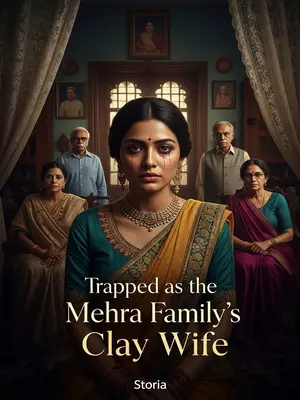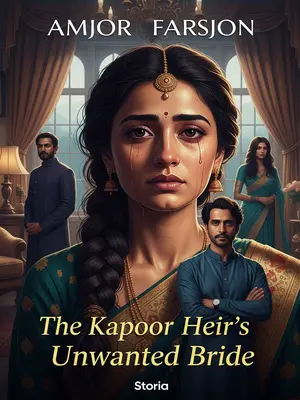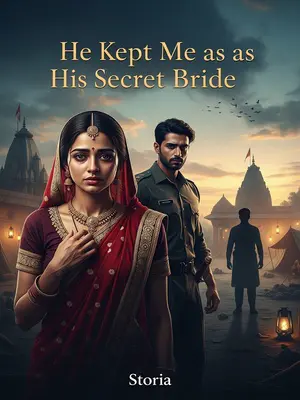Chapter 2: Fever and Farewell
Stricken by illness again, I bit down hard on the bedsheet to stifle my cries, sweat soaking my forehead.
Each shuddering breath rattled through my chest like the rickety fan above. The city outside was awake—horns honking, a distant shout from a street hawker—but all I heard was the echo of my own pain.
The man who always came at the first sign of my pain didn’t appear this time.
Not even the sound of his careful footsteps in the hallway, or the soft clink of his medicine bottles. The silence pressed down on me more than the fever.
Meera’s eyes were red as she wiped my brow, muttering anxiously, "Didi, Saab never forgets your illness day... Why hasn’t he come today, haan?"
Her voice trembled, the words nearly drowned out by the ceiling fan's whirr. Her pallu slipped as she dipped the cloth again, and she adjusted it distractedly.
A WhatsApp notification buzzed on Meera’s old phone, ignored as she wrung out the cloth again.
I hadn’t felt such agony in three years.
Not since the monsoon of our first year together, when Kabir spent the whole night chanting shlokas and mixing kadha for me, his own hands trembling. That memory now stung sharper than the fever.
A trembling servant rushed in, clutching a letter. Meera snatched it and read aloud: "The Maharani has been poisoned. Your husband has been urgently summoned to the capital. Please, my wife, take care..."
The words hung in the air, heavier than lead. Even the way Meera read them—halting, voice choked—made my head spin. The paper fluttered to the floor, brushing against my toes.
The ink was still wet, clearly written not long ago. Gritting her teeth, Meera demanded, "When did Saab leave?"
Her eyes flashed—half accusation, half fear. She looked at the servant as if he were personally responsible for my misery.
"This morning." The servant dared not lie; everyone knew today was the day of my illness.
He stared at the ground, fingers twisting the edge of his kurta. I almost felt sorry for him, caught in the crossfire of a story bigger than all of us.
"Get out," I forced myself to say. Meera closed the door, and another wave of pain hit me, tears streaming down my cheeks.
I pressed my palms to my eyes, just like Ma used to do when the world became too much. The pillow muffled my sobs, and I bit down until I tasted blood. The room grew unbearably hot, the old wall clock ticking like a scolding elder.
The moment I heard "the Maharani," I knew I had lost.
There was a finality to the word—Maharani. It didn’t matter if she was just another character. In Kabir’s eyes, she was the whole story. My hands shook as I clutched the bedsheet.
"Didi, I’ll fetch the doctor." Seeing my suffering, Meera turned to go, but faltered.
She hovered by the door, torn between duty and despair. Her concern was so real, I wanted to cry for her sake too.
Kabir was a renowned vaidya—only he could control my illness. And in the Doctor’s Bungalow, how could there be anyone else?
The air was thick with the smell of neem and turmeric. Even the servants whispered his name with reverence. There was no one else who could touch the illness rooted inside me.
I knew he was the second male lead, that he once loved the heroine deeply. But I never thought he would treat me this way.
I closed my eyes, remembering the way he used to smile at her in the book. Even now, my heart twisted at how quickly I became invisible.
My chest felt tight, each breath a torture.
I could hear my own heartbeat, frantic and uneven, echoing through my ears. My fingernails dug into the sheet, leaving crescent moons.
I landed in the book very early—while still in the womb. At first, I thought I’d simply travelled through time.
The realisation had been slow, like peeling the layers off a banana leaf. When I first opened my eyes to a world of Hindi lullabies and oil lamps, I thought it was just another dream.
It wasn’t until I met Kabir that I realised I was inside a novel.
There was something about the way the world bent around him, the way every plot seemed to lead to his door, that felt too deliberate to be chance.
Because of my illness, my father sought countless miracle doctors, but none could cure me.
We travelled from holy men in Haridwar to city specialists in Mumbai. Naani sent blessed coconuts from temples, masi lit diyas at every festival. But nothing worked.
Only after learning where Kabir was secluded did we finally meet.
Papa had bribed a tonga-wallah for information, knocking on Kabir’s door just as the sun set. The smell of incense, mixed with medicinal herbs, still lingers in my memory.
Papa wanted me to marry him. I wanted to refuse, but seeing Papa’s bloodshot eyes, I agreed.
His hands were rough from work, but gentle as he pressed them together in namaste, silently pleading. I swallowed my own wishes, the way Indian daughters always do.
At first, I reminded myself that the second male lead loved the heroine. No matter how extraordinary he was, I wouldn’t allow myself to fall for him.
I made little vows to myself, knotting my dupatta tight around my waist, telling myself to stay strong. Love was a luxury I could not afford.
But hearts are made of flesh. After three years of marriage, how could I remain unmoved?
The way he remembered my mother’s death anniversary, leaving fresh jasmine on her photo. The way he never let the diya burn out during my worst nights. Little things melted my resolve like ghee on hot rotis.
He gave me ayurvedic treatments every night, dispelling my illness, and every time I fell ill, he stayed by my side.
I could feel his presence even before he entered—his shadow in the doorway, his familiar scent of sandalwood and neem. He never let Meera handle the worst of it; always, he was there, the calm in my storm.
Everyone said I wouldn’t live past sixteen, but only Kabir declared, "With me here, you’ll live to a hundred."
He would say it with that half-smile, voice low so only I could hear. Sometimes I believed him, just because he sounded so certain.
Now I’m eighteen, and I’ve outlived that curse.
Every birthday, Papa would cry quietly, lighting a sparkler on the cake, while Kabir pressed his lips to my forehead. But this year, there was only silence.
Looking back at the book’s plot, the story had already ended. The second male lead had retired to a small town, the leads ruled the world together.
It all felt so far away now, like a memory from another lifetime. I wondered if I’d slipped through the cracks in the story, an afterthought left to fend for herself.
I thought he’d left the story behind and truly fallen in love with me.
Sometimes, at night, he’d recite Urdu couplets under his breath, and I’d let myself dream he meant them for me. Foolish, but sweet.
His affection was so deep I couldn’t avoid it. The lock on my heart was pried open, little by little.
Each day, a little more warmth seeped into my bones. Every festival, every ordinary evening, the boundaries between us faded.
But just as I acknowledged my own feelings, fate played a cruel joke.
As always, the story belonged to someone else. I was a mere footnote, a line destined for erasure.
This was supposed to be the last time I’d fall ill. Kabir said after this, I’d be cured.
He’d held my hand, promising that we’d do a puja together when I recovered. I’d already chosen a saree for the occasion—a simple yellow one, embroidered by Meera.
If the illness wasn’t fully expelled, there would be a backlash.
His warnings echoed in my ears, stern as a schoolmaster’s: "No skipping medicines, Ananya. No overexertion. Don’t test your luck now."
He worried over me day and night, and just yesterday whispered in my ear, "Ananya, once you recover, shall we finally start our real married life?"
His breath was warm against my cheek. My cheeks burned, and I ducked my head, heart pounding like a dhol at a wedding.
I blushed, gently touching his lips.
The memory felt bittersweet now—a moment of closeness that seemed like a lifetime ago.
Yet today, he left me on the day of my illness, without hesitation, to detoxify the heroine.
I stared at the empty space where he used to sit beside me. Even the lamp by my bedside flickered uncertainly.
But aren’t there countless royal doctors in the palace? Why must it be him?
Wasn’t I also someone’s precious daughter, someone’s wife? The unfairness of it all gnawed at me, bitter as karela.






